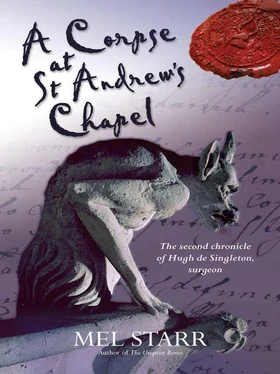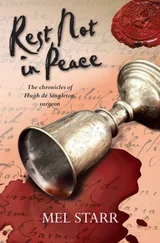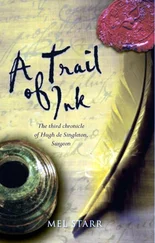Mel Starr - A Corpse at St Andrew's Chapel
Здесь есть возможность читать онлайн «Mel Starr - A Corpse at St Andrew's Chapel» весь текст электронной книги совершенно бесплатно (целиком полную версию без сокращений). В некоторых случаях можно слушать аудио, скачать через торрент в формате fb2 и присутствует краткое содержание. Год выпуска: 2010, Издательство: Kregel Publications, Жанр: Исторический детектив, на английском языке. Описание произведения, (предисловие) а так же отзывы посетителей доступны на портале библиотеки ЛибКат.
- Название:A Corpse at St Andrew's Chapel
- Автор:
- Издательство:Kregel Publications
- Жанр:
- Год:2010
- ISBN:нет данных
- Рейтинг книги:5 / 5. Голосов: 1
-
Избранное:Добавить в избранное
- Отзывы:
-
Ваша оценка:
- 100
- 1
- 2
- 3
- 4
- 5
A Corpse at St Andrew's Chapel: краткое содержание, описание и аннотация
Предлагаем к чтению аннотацию, описание, краткое содержание или предисловие (зависит от того, что написал сам автор книги «A Corpse at St Andrew's Chapel»). Если вы не нашли необходимую информацию о книге — напишите в комментариях, мы постараемся отыскать её.
A Corpse at St Andrew's Chapel — читать онлайн бесплатно полную книгу (весь текст) целиком
Ниже представлен текст книги, разбитый по страницам. Система сохранения места последней прочитанной страницы, позволяет с удобством читать онлайн бесплатно книгу «A Corpse at St Andrew's Chapel», без необходимости каждый раз заново искать на чём Вы остановились. Поставьте закладку, и сможете в любой момент перейти на страницу, на которой закончили чтение.
Интервал:
Закладка:
As I walked past the pile of wattle sticks I absently grasped a wand and flexed it, as if to try the forester’s opinion. The twig bent readily, indeed. I replaced it and strolled on.
The door to the rear of Gerard’s cottage stood open to the warm spring day and I glanced in as I walked past. A bench occupied the doorway, placed so as to catch the sun. On it were a dozen or so of the straightest poplar shafts, a knife, and a scattering of goose feathers.
Gerard again noted the direction of my gaze and spoke. “Can’t shoot arrows now, since me eyes is gone cloudy an’ me arm’s too weak to hold a bow steady, but nobody makes a truer shaft. All say so.”
“You use poplar?” I enquired as I picked up one of the unfinished arrows.
“An’ alder…for practice, like. Was we t’be at war wi’ the Frenchies again I’d use ash. Poplar be good enough for practice.”
“And hunting?”
“Hunting?” The verderer stepped back in shock. “Lord Gilbert hunts wi’ hawks an’ hounds an’ none other may hunt in this wood…’Tis my job t’see t’that.” He concluded this remark with some vehemence.
“You’ve seen no sign of poachers in Lord Gilbert’s forest? No unburied bones or entrails?”
“Nay! Me an’ me lads keep a sharp eye for such practice…well, Richard an’ Walter do. Me eyes, you know…’Twould be worth me position to allow thieves to take Lord Gilbert’s deer.”
“Do you make arrows to sell, or are they for your sons’ use? I saw Richard two weeks past, I think, at the castle of a Sunday afternoon.”
“I make ’em, mostly to keep me ’and in practice, like. Not much use for arrows now’t we ain’t got Frenchies t’shoot at. ’Spect that’ll change. Usually does.”
I agreed. Peace is too valuable to use overmuch. It must be parceled out in small quantities, interspersed between large amounts of war. King Edward would soon find reason enough to resume war in France, I was sure. Or the French king would find cause to attack English possessions. Gerard knew this as well as did every Englishman, and Frenchman too.
The beams, ready or not, could not be taken to Bampton until Friday, for Tuesday and Wednesday were also Rogation Days, and Thursday was Ascension Day.
I awoke early on Ascension Day and after a breakfast of maslin loaf and ale went to the castle parapet to watch the dressing of the Ladywell. This well is ancient, its water said to bring miraculous cures to the ill who seek relief in faith. Even beasts are said to recover health if brought to drink water from the well.
Devout men of centuries past had built a small grotto about the well. Even before I mounted the parapet faithful men and women had begun to bedeck the stones with flowers. Before St Beornwald’s bell rang for matins the Ladywell — so named as sacred to the mother of Christ — was covered in blooms.
I left the parapet and castle and joined others in procession to the church. Many carried new willow shoots in honor of the day, bundled with blue ribbons of linen or woolen strips.
Ascension Day mass is, to me, a joyous event. I am reminded that Christ said He would one day return in like manner as He departed. Such a day will indeed be a joy, for after it there will be no more pestilence or famine. Princes will no longer war upon each other and the commons. I might almost wish Christ may return tomorrow.
But should He do so I will never hold a dear wife close, nor shall I watch children and grandchildren play about my feet. Much sorrow will be ended when the Lord Christ returns, but some joy also. Considering all, it is my wish that our Lord delay His return awhile yet. Perhaps when I am bent with age and stumble upon my way with rheumy eyes and unsure step, then perhaps, when I have seen sons grow to honorable manhood, then I might be pleased to see Christ appear in the eastern sky. Well, I think our Lord will appear when He is ready, which time neither I nor any man can know. So it will behoove me to be ready when He is. Although I do pray He will tarry until I find a good wife.
Early Friday morning I sent six men, six horses, and three carts to Alvescot to haul the beams to the castle. I thought two trips from each would complete the work. It was near the twelfth hour, the sun hanging low above the west forest, when the heavily laden carts appeared a second time through the trees bearing their burdens.
The carts and their tired horses and villeins passed through the gatehouse and made their way toward the southeast corner of the castle yard, where the marshalsea was to be extended. I watched as the beams were unloaded, having nothing better to do until the evening meal, when from the corner of my eye I saw John Holcutt standing under the gatehouse in conversation with a woman.
I perceived nothing unusual in this conversation so paid it no mind. But a few moments later the reeve approached, smiling, holding a spade in one hand and some obscured object in the other.
“You seem pleased with yourself, John”
“Aye. I have done Lord Gilbert good service this day.”
“How so?”
The reeve held forth the spade. It was iron, and well made. “I have added this to the castle tools…for two pence. And,” he continued, “two nails, for a farthing.”
John lifted the object in his left hand and presented it for my examination. It was a block of wood — beech, I think — about the length of a man’s hand, half as broad, and two fingers in thickness. Driven through this wooden fragment were two iron nails, each as long as a man’s fingers.
“What do you suppose it may be?” the reeve asked as I took the object and inspected it. “I see no useful purpose for such a tool. Seems a waste of two nails to me.”
“Well, the nails will be useful for the new stables. And tuppence for a good shovel is money well spent. Who sold these for such a price?”
“A woman…she brought the shovel to the gatehouse an’ asked Wilfred was anyone about who might buy from her. He sent for me. She would have three pence, she said, an’ ’twould have been a good price. But I got her to take two.”
“Do you know this woman?”
“Nay. Said as she was a poor widow what needed to feed ’er younguns. Seemed well enough fed to me.”
“Come,” I nodded toward the gatehouse. “Perhaps Wilfred will know who ’twas.”
John peered at me beneath a furrowed brow. “Is it important?”
“Probably not, yet I am uneasy about this bargain.”
“You think I did wrong in spending Lord Gilbert’s money so?”
“No. You spent wisely. But who sold these, and why, and what this,” I lifted the wooden block with its nails, “may be is a puzzle to me.”
Wilfred watched us approach from his post at the gatehouse. He sat on a bench, his back against stones warmed by the afternoon sun, but stood, as well he might, when reeve and bailiff both approach.
“The woman who sold these to John…do you know her?”
“Aye,” the porter replied. “Emma, her whose man got buried a month past.”
I studied the spade John Holcutt carried. No doubt it was the tool I’d seen the woman plying the day I sought her husband and found her in the toft. Whatever Henry atte Bridge’s source of income was which allowed him to purchase an iron spade, both he and it were now gone. Doubtless the woman needed two pence more than an iron spade.
I sent the reeve to the castle storeroom with the spade, but kept the wooden block with its embedded nails. The device intrigued me. I placed it in my chamber while I supped, but my mind was not on the meal. Until the second remove, when was served a favorite dish of mine — pork in spiced syrup. I cut a substantial piece from the roast as a groom placed it before me.
While I enjoyed the pork I noted that much of the syrup soaked into the trencher. If I wished to enjoy the flavor of the malmsey and spices in the syrup I must eat of the stale bread. I admit I considered this, but decided it might appear gluttonous to those who dined with me.
Читать дальшеИнтервал:
Закладка:
Похожие книги на «A Corpse at St Andrew's Chapel»
Представляем Вашему вниманию похожие книги на «A Corpse at St Andrew's Chapel» списком для выбора. Мы отобрали схожую по названию и смыслу литературу в надежде предоставить читателям больше вариантов отыскать новые, интересные, ещё непрочитанные произведения.
Обсуждение, отзывы о книге «A Corpse at St Andrew's Chapel» и просто собственные мнения читателей. Оставьте ваши комментарии, напишите, что Вы думаете о произведении, его смысле или главных героях. Укажите что конкретно понравилось, а что нет, и почему Вы так считаете.












